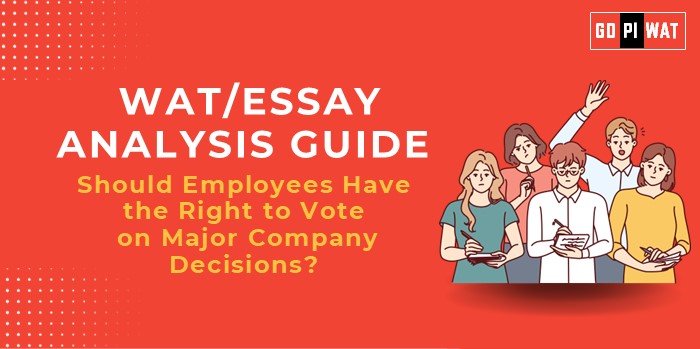📋 WAT/Essay Analysis Guide
🌟 Topic: Should Employees Have the Right to Vote on Major Company Decisions?
🌐 Understanding the Topic’s Importance
The topic explores a progressive question about workplace democracy, employee satisfaction, and ethical governance. It challenges traditional corporate structures and highlights the evolving dynamics between stakeholders, employees, and management.
📚 Effective Planning and Writing
- Time Allocation:
- Planning: 5 minutes
- Writing: 20 minutes
- Review: 5 minutes
- Preparation Tips: Gather global examples (e.g., Germany’s co-determination model, Volkswagen) and note challenges like expertise and efficiency.
✍️ Introduction Techniques for Essays
-
Contrast Approach:
“While traditional corporate governance prioritizes shareholders, companies like Volkswagen showcase how employee voting fosters long-term sustainability.” -
Question Approach:
“Should only shareholders decide a company’s future when employees are equally invested in its growth?” -
Historical Approach:
“Inspired by Germany’s co-determination model, the question of granting employees voting rights has sparked global debates about corporate democracy.”
🏆 Structuring the Essay Body
Paragraph 1: Achievements
- Example: Germany’s co-determination model improved worker relations and economic growth.
- Data: “Over 90% of German companies report reduced turnover and higher innovation rates.”
Paragraph 2: Challenges
- Operational Inefficiencies: “Employee representation risks delaying decisions, hampering operational speed.”
- Global Comparison: The U.S. contrasts this model with efficiency-centric governance.
Paragraph 3: Future Outlook
- Balanced Implementation: Introduce hybrid voting rights focusing on ethical governance and productivity.
📄 Concluding Effectively
-
Balanced Perspective:
“While employee voting rights foster inclusivity, a balanced approach ensures that operational efficiency is not compromised.” -
Global Comparison:
“The success of Germany’s co-determination contrasts with resistance in shareholder-driven economies like the U.S. Finding middle ground is key.”
🔍 Analyzing Successes and Shortcomings
- Key Achievements: Improved morale, ethical practices, and German case studies.
- Ongoing Challenges: Lack of expertise, operational slowdowns.
- Global Context: Germany vs. U.S.A.
💡 Recommendations for Sustainable Progress
- Introduce employee councils with selective voting rights on ethical and policy matters.
- Develop training programs to equip employees for decision-making roles.
📖 Sample Short Essays
1. Balanced Perspective
“Employee voting fosters workplace democracy and transparency, but it must be strategically implemented to balance inclusivity with efficiency.”
2. Solution-Oriented
“The answer lies in hybrid models where employees influence decisions on ethical issues and operations remain streamlined.”
3. Global Comparison
“Germany’s co-determination model proves that employee participation can coexist with profitability, offering a blueprint for other economies.”
🌍 Real-World Relevance
This guide equips B-school aspirants with practical insights into workplace democracy, fostering critical thinking for group discussions and essay writing tasks.


